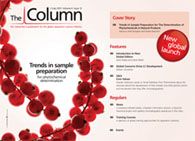Brazilian informatics solution
A Brazilian pharmaceutical supply group has implemented an integrated informatics solution from Thermo Fisher Scieintifc, consisting of a laboratory information management system and a chromatography data system.
A Brazilian pharmaceutical supply group has implemented an integrated informatics solution from Thermo Fisher Scieintifc, consisting of a laboratory information management system and a chromatography data system. It is reported that the company, GPSG Brazil, will use the system to enhance quality control in its São José dos Campos pharmaceutical production facility in São Paulo, Brazil.
Discussing the choice of system, Ronaldo Galvao, quality operations director said, “We needed a validated product that provides us with sufficient flexibility to deliver all the requirements of a pharmaceutical plant. The overall integration of our connected informatics solutions provides a seamless and secure quality environment.”
Every month, the Brazilian manufacturing plant processes more than 10,000 analyses to ensure the quality of nearly 2000 samples of raw materials, packaging materials, semi-finished and finished products, in addition to water and stability testing.
“Thermo Fisher Scientific works with many of the world’s leading pharmaceutical companies to support their manufacturing quality and ensure their ongoing success,” added Dave Champagne, vice president and general manager, Informatics at Thermo Fisher Scientific. “Our growing presence in South America providing informatics solutions to a broad range of industries is strengthened by our work with GPSG Brazil to support their ongoing production schedules and to improve their processes.”
For further information visit www.thermoscientific.com/janssen-cilag
This story originally appeared in The Column. Click here to view that issue.
Polysorbate Quantification and Degradation Analysis via LC and Charged Aerosol Detection
April 9th 2025Scientists from ThermoFisher Scientific published a review article in the Journal of Chromatography A that provided an overview of HPLC analysis using charged aerosol detection can help with polysorbate quantification.
Analyzing Vitamin K1 Levels in Vegetables Eaten by Warfarin Patients Using HPLC UV–vis
April 9th 2025Research conducted by the Universitas Padjadjaran (Sumedang, Indonesia) focused on the measurement of vitamin K1 in various vegetables (specifically lettuce, cabbage, napa cabbage, and spinach) that were ingested by patients using warfarin. High performance liquid chromatography (HPLC) equipped with an ultraviolet detector set at 245 nm was used as the analytical technique.
Removing Double-Stranded RNA Impurities Using Chromatography
April 8th 2025Researchers from Agency for Science, Technology and Research in Singapore recently published a review article exploring how chromatography can be used to remove double-stranded RNA impurities during mRNA therapeutics production.












